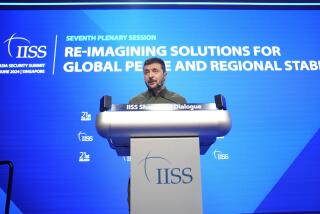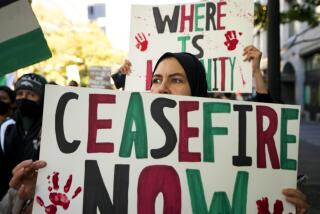PLO Radicals, Moderates Gear Up for a Showdown : Mideast: The outcome could determine the fate of regional peace talks and Arafat’s fragile leadership.
DAMASCUS, Syria — With potential Middle East peace talks approaching, the Palestine Liberation Organization is preparing for a showdown between moderates seeking accommodation with the West and radicals determined to block PLO Chairman Yasser Arafat’s path toward peace--if peace means compromise.
For the first time since his historic announcement recognizing Israel and renouncing terrorism, Arafat will confront both the leadership and dissenters from his far-flung organization in an attempt to develop a unified Palestinian stand before any peace talks commence.
The Palestine National Council, a Palestinian parliament in exile, is scheduled to convene next month for the first time in three years, permitting a referendum on Arafat’s moves toward peace and attempting to harmonize a badly split Palestinian community that is at its most vulnerable point in years.
The outcome of the meeting could be a turning point in the peace process because there is little hope for a real settlement to the long-running Arab-Israeli conflict unless the Palestinians are on board.
The September meeting is also likely to be a referendum on Arafat--a mercurial, often-dictatorial guerrilla chief turned political leader. He could emerge with a significantly weakened hand as the PLO moves toward democracy, according to diplomats and Palestinian sources.
Radical Palestinian factions in Damascus, for years on the outs with the PLO leader, have been courted back toward the fold in recent months after Arafat’s support for Iraqi President Saddam Hussein in the Persian Gulf War left him dangerously exposed. Now, they say their price for reconciliation is an end to further concessions to the West.
For the first time in years, Arafat is expected to meet in the weeks before the PNC meeting with hard-line Palestinian leaders in an attempt to reach accommodation.
Among the hard-liners are Ahmed Jibril, head of the Popular Front for the Liberation of Palestine-General Command, and Abu Nidal, head of the Fatah Revolutionary Council, both suspected terrorists. Arafat is also expected to meet with radical fundamentalist groups such as Hamas and Islamic Jihad, which have not yet formally accepted invitations to the September meeting.
Many of these groups have not renounced terrorism and still advocate a Palestine that includes all the territory of Israel.
“What this means is not good, at least not good for the PLO,” said a European diplomat in Damascus.
Khaled Fahoum, head of a coalition of four Damascus-based Palestinian groups, including the PFLP-GC, said the groups notified Arafat last week that they are accepting his invitation to meet in Sana, Yemen, before the PNC convenes in Algiers on Sept. 15.
“We’re not asking him to take everything back but to stop being individualistic, to stop giving concessions for nothing,” Fahoum said in an interview. “He’s made too many concessions during the past six to seven years, but he didn’t get anything for it. They were concessions without any price. Also, he made a big mistake by siding with Saddam Hussein. We want him to acknowledge that, to have self-criticism.”
Jibril said in an interview last week that Damascus-based Palestinian leaders will demand, as their price for rejoining the PNC, that the PLO modify its political program to insist on the right of Palestinians to return to pre-Israeli Palestine and their right to self-determination.
“Any Palestinian leader who makes a deal without making these conditions, I have stated, he will be beheaded,” said Jibril, who was born in the village of Yazour, near Jaffa on the coast south of Tel Aviv.
“We quit the PLO in 1983, and since then they have adopted concessions which are regarded from our point of view as blunders,” he said. “Arafat believed by making these concessions he would be made a full partner in the peace process. Instead, they have put him on the garbage container. . . .”
Asked to specify which concessions he most disagrees with, Jibril said: “He recognized Israel’s right of existence, and we reject this.”
The PLO has not formally responded to proposals for an international peace conference in October. It has also waffled on accepting what is widely believed to be its only option for participating in the conference: a non-PLO committee of Palestinians who sit on a joint delegation with Jordan.
At first, the PLO leadership in Tunis quietly backed statements from PLO officials in Jordan that the Palestinians would agree to a joint delegation. Then, faced with the growing radical backlash that is becoming even more apparent now, Arafat denounced the idea of a joint delegation. He also held firm on the other major sticking point in the negotiations: Israel’s refusal to talk to Palestinians from East Jerusalem.
Earlier this month, in a speech to mark the beginning of the 45th month of the uprising in the Israeli-occupied West Bank and Gaza Strip, Arafat said the PLO was prepared to go to a peace conference only under certain conditions. He said the PLO wants guarantees that the aim of the conference will be to implement U.N. resolutions stipulating Israeli withdrawal from territories occupied in the 1967 Middle East War and recognition of the Palestinians’ national rights and the right to self-determination.
He said the PLO must decide how Palestinians are represented and that Jerusalem constitutes a “red line” whose exclusion from the peace process means a veto for peace. He reiterated the Palestinians’ demand for a halt to the building of Jewish settlements in the occupied territories.
Palestinians continued their diplomatic efforts over the weekend. On Saturday, British Foreign Office representatives and leading Palestinians met in London for two hours to discuss the peace conference, a Foreign Office spokeswoman said. She declined to give details, and the PLO declined comment.
The Palestinian leaders involved in the talks were Faisal Husseini, Hanan Ashrawi and Zakariya Agha, according to the British Broadcasting Corp.’s Arabic Service. The three led the Palestinian side in recent meetings with Secretary of State James A. Baker III on his peace talks proposal.
Arafat’s moves toward reconciliation with radical Palestinian factions come at a time when he is isolated from the moderate Arabs who have provided the underpinning for his moves toward the West in recent years.
Although several senior PLO officials have visited Egypt in recent weeks, Arafat, in his only visit to Cairo since the Persian Gulf War, arrived in an Iraqi jet and did not leave the plane. He is also not welcome among his former financial backers in the Persian Gulf.
Farouk Kaddoumi, head of the PLO political department and its nominal foreign minister, made the initial overtures toward the Damascus-based groups in the last several weeks. He reportedly assured them that the PLO would hold firm against agreeing to a joint delegation with Jordan at any international peace conference.
“We are for a peace conference, provided the PLO names a Palestinian delegation and it is a separate, equal delegation,” said Kaddoumi. “Arafat recognizes Israel. We say we are ready to recognize Israel if Israel recognizes the PLO.”
Kaddoumi said the upcoming PNC meeting could mark the first time that the Muslim group Hamas, which is attracting growing support in the occupied territories, and Islamic Jihad have participated in the PNC. But he said Hamas ultimately might not take part because it is unlikely that the PLO and Hamas can agree on the latter’s demand for 40% of the seats on the council in recognition of its claim of popular support in the territories.
Likewise, Islamic Jihad may elect not to participate because of its substantial backing from Iran, which so far has been vocally opposed to the scheduled September PNC conference.
“All of us are looking for a redivision of power,” Kaddoumi said. “The PLO is not in its best position now. Its credibility is much lower; Arafat needs to share power. The PLO is in a weak position. But unity gives strength.”
More to Read
Sign up for Essential California
The most important California stories and recommendations in your inbox every morning.
You may occasionally receive promotional content from the Los Angeles Times.










